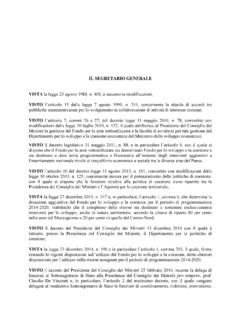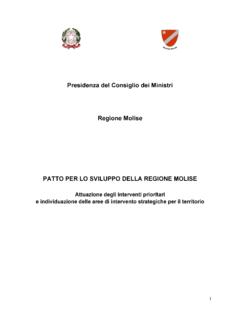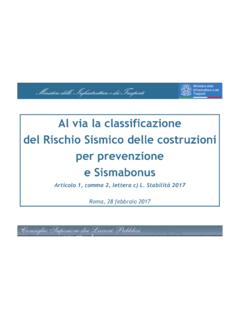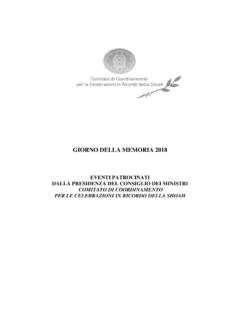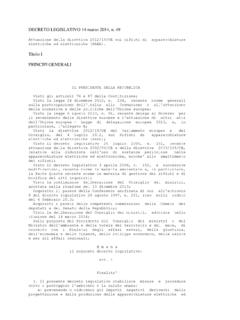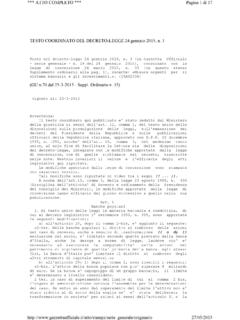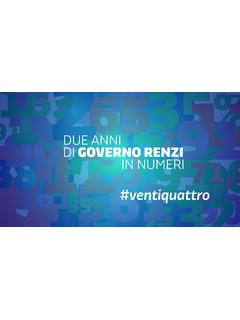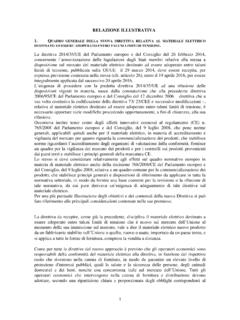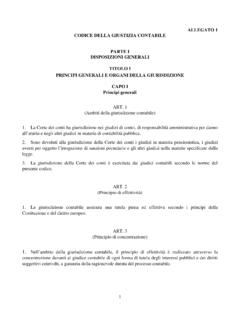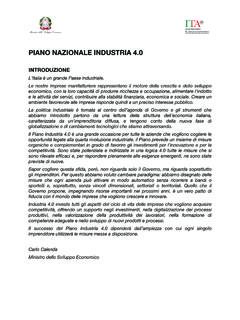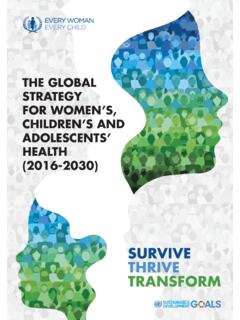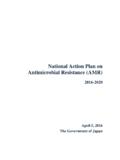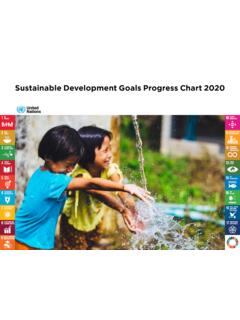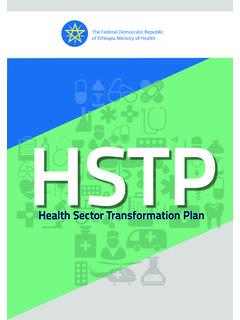Transcription of G20 ROME LEADERS’ DECLARATION
1 Page 1 of 20 G20 ROME LEADERS DECLARATION 1. We, the Leaders of the G20, met in Rome on October 30th and 31st, to address today s most pressing global challenges and to converge upon common efforts to recover better from the COVID-19 crisis and enable sustainable and inclusive growth in our Countries and across the world. As the premier forum for international economic cooperation, we are committed to overcoming the global health and economic crisis stemming from the pandemic, which has affected billions of lives, dramatically hampered progress towards the achievement of the Sustainable Development Goals and disrupted global supply chains and international mobility.
2 With this in mind, we express our profound gratitude to the health and care professionals, frontline workers, international organizations and scientific community for their relentless efforts to cope with COVID-19. 2. Underlining the crucial role of multilateralism in finding shared, effective solutions, we have agreed to further strengthen our common response to the pandemic, and pave the way for a global recovery, with particular regard to the needs of the most vulnerable. We have taken decisive measures to support Countries most in need to overcome the pandemic, improve their resilience and address critical challenges such as ensuring food security and environmental sustainability.
3 We have agreed upon a shared vision to combat climate change, and taken important steps towards the achievement of gender equality. We have also further advanced in our common efforts to ensure that the benefits of digitalization are shared broadly, safely and contribute to reducing inequalities. 3. global economy. Over 2021, global economic activity has been recovering at a solid pace, thanks to the roll-out of vaccines and continued policy support. However, the recovery remains highly divergent across and within countries, and exposed to downside risks, in particular the possible spread of new variants of COVID-19 and uneven vaccination paces. We remain determined to use all available tools for as long as required to address the adverse consequences of the pandemic, in particular on those most impacted, such as women, youth, and informal and low-skilled workers, and on inequalities.
4 We will continue to sustain the recovery, avoiding any premature withdrawal of support measures, while preserving financial stability and long-term fiscal sustainability and safeguarding against downside risks and negative spill-overs. Central banks are monitoring current price dynamics closely. They will act as needed to meet their mandates, including price stability, while looking through inflation pressures where they are transitory and remaining committed to clear communication of policy stances. We remain vigilant to the global challenges that are impacting on our economies, such as disruptions in supply chains. We will work together to monitor and address these issues as our economies recover and to support the stability of the global economy.
5 We commit to advancing the forward-looking agenda set in the G20 action plan as updated in April 2021 and we welcome the Page 2 of 20 fourth Progress Report. We reaffirm the commitments on exchange rates made by our Finance Ministers and Central Bank Governors in April 2021. 4. Health. Recognizing that vaccines are among the most important tools against the pandemic, and reaffirming that extensive COVID-19 immunization is a global public good, we will advance our efforts to ensure timely, equitable and universal access to safe, affordable, quality and effective vaccines, therapeutics and diagnostics, with particular regard to the needs of low- and middle-income countries.
6 To help advance toward the global goals of vaccinating at least 40 percent of the population in all countries by the end of 2021 and 70 percent by mid-2022, as recommended by the World Health Organization (WHO) s global vaccination strategy, we will take steps to help boost the supply of vaccines and essential medical products and inputs in developing countries and remove relevant supply and financing constraints. We ask our Health Ministers to monitor progress toward this end and to explore ways to accelerate global vaccination as necessary. 5. We will reinforce global strategies to support research and development as well as to ensure their production and swift and equitable distribution worldwide, also by strengthening supply chains and by expanding and diversifying global vaccine manufacturing capacity at local and regional level, while promoting vaccine acceptance, confidence and fighting disinformation.
7 To this end, we commit to refrain from WTO inconsistent export restrictions and to increase transparency and predictability in the delivery of vaccines. We reiterate our support to all pillars of the ACT-Accelerator, including COVAX, and will continue to improve its effectiveness. We support the extension of ACT-A s mandate throughout 2022 and acknowledge the formation of the Multilateral Leaders Task Force on COVID-19. We welcome the work undertaken by the COVAX ACT-A Facilitation Council Vaccine Manufacturing Working Group and its report aimed at creating a broader base for vaccine manufacturing. In particular, we will support increasing vaccine distribution, administration and local manufacturing capacity in LMICs, including through technology transfer hubs in various regions, such as the newly established mRNA Hubs in South Africa, Brazil and Argentina, and through joint production and processing arrangements.
8 We will work together towards the recognition of COVID-19 vaccines deemed safe and efficacious by the WHO and in accordance with national legislation and circumstances, and to strengthen the organization s ability regarding approval of vaccines, including optimizing procedures and processes, with the aim of broadening the list of vaccines authorized for emergency use (EUL), while continuing to protect public health and ensuring privacy and data protection. As a collective G20 effort, and in light of the enduring vaccination gaps, we commit to substantially increase the provision of and access to vaccines, as well as to therapeutics and diagnostics.
9 We will enhance our efforts to ensure the transparent, rapid and predictable delivery and uptake of vaccines where they are needed. We call on the private sector and on multilateral financial institutions to contribute to this endeavor. We acknowledge the work of the World Bank Group in this respect and of the IMF and the WHO through the vaccine supply forecast dashboard. 6. We reaffirm our commitment to the global Health Summit Rome DECLARATION as a compass for collective action and are committed to strengthening global health governance. We support the ongoing work on strengthening the leading and coordination role of an adequately and sustainably Page 3 of 20 funded WHO.
10 We acknowledge that financing for pandemic prevention, preparedness and response (PPR) has to become more adequate, more sustainable and better coordinated and requires a continuous cooperation between health and finance decision-makers, including to address potential financing gaps, mobilizing an appropriate mix of existing multilateral financing mechanisms and explore setting up new financing mechanisms. We establish a G20 Joint Finance-Health Task Force aimed at enhancing dialogue and global cooperation on issues relating to pandemic PPR, promoting the exchange of experiences and best practices, developing coordination arrangements between Finance and Health Ministries, promoting collective action , assessing and addressing health emergencies with cross-border impact, and encouraging effective stewardship of resources for pandemic PPR, while adopting a One Health approach.
